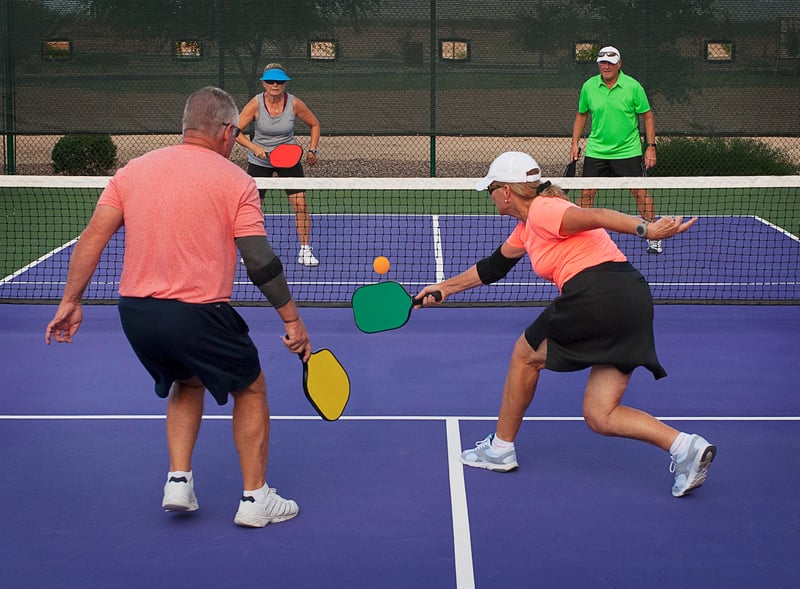Pickleball Is All the Rage, Here's Tips on Preventing Injuries
By Cara Murez HealthDay Reporter | Copyright © 2022 HealthDay. All rights reserved.

MONDAY, Oct. 16, 2023 (HealthDay News) -- Pickleball has become wildly popular, but that may be fueling a rise in pickleball-related injuries.
“It’s quickly becoming a sport of choice for adults over the age of 50,” said Dr. Brian Cole, an orthopedic surgeon and sports medicine specialist at Rush University Medical Center in Chicago. He also plays pickleball.
“The high injury rate can be attributed to the fact that most players tend to be over 50,” Cole said in a hospital news release. “And many of them were largely sedentary before picking up their pickleball paddles.”
Pickleball is like a hybrid of ping-pong and tennis, and attracts many beginners. In his practice, Cole often sees strains and sprains, mostly in the legs and ankles. Rotator cuff injuries are also common. Sometimes he sees more serious injuries, including fractures and concussions.
Here, Cole offers some pointers on avoiding injury.
A good first step to avoid injury is to first get an assessment of your health from your primary care physician and possibly also a physical therapist. You may not be as prepared to jump into play as you think if you haven’t been very active in a while.
“Patients over 60 account for nearly 80% of pickleball injuries, and most of them are male,” Cole said.
Importantly, many seniors have underlying conditions they don’t know about.
“Millions of people walk around with rotator cuff tears but have no pain because they’re well adapted,” Cole said. “But then they go out, adopt this new sport, and they do some funky move that puts them over the edge, and they become symptomatic. And that’s when things kind of spiral.”
When getting started, remember to do warmup exercises.
“For our older patients, a dynamic warmup is pretty important,” Cole said. “Doing some type of exercise prep beforehand makes a big difference to prevent injury.”
He recommends starting with a 10-minute warmup that should begin with some jogging or jumping jacks. You’ll get your heart rate up and blood flowing to your muscles.
After that, do some arm circles and shoulder rotations. Hold your arms straight out from your sides and rotate them in small circles, then gradually make bigger circles before rotating in the opposite direction. Put your arms in front of you and rotate your shoulders forward and back.
Finish with some leg swings. Stand next to a wall for support, then swing one leg back and forth, then side to side. Repeat those steps with your other leg.
To build coordination, Cole recommends running a few drills that should only take about 15 minutes. First is the side-to-side shuffle. Stand with your feet shoulder-width apart, then quickly move side to side.
For the cross-step drill, put your feet shoulder-width apart. Cross one leg in front of the other diagonally. Then quickly move your back leg out from behind the front leg to return to the position you started in. Keep moving side-to-side, crossing and uncrossing your legs in this way.
Choose the right gear, too, including a paddle that is appropriate for your strength level.
“Lightweight paddles offer less strain and fatigue in your arms as they weigh 7.5 ounces and less,” Cole said.
You may need different shoes for outdoor and indoor play.
“Shoes for outdoor games should be durable enough for the surface of the court. They typically have a modified herringbone pattern that optimizes the combination of give and grip. Indoor shoes have softer, thinner, lighter outsoles, so they’re best for hardwood surfaces,” Cole said.
Have extra socks on hand to help prevent blisters and foot injuries.
Protect yourself from the sun with sunglasses, possibly with a strap or cord that helps keep them in place, and sunscreen of SPF 50 or higher.
Getting a lesson can help you learn to play or improve technique.
Once you’re on the court, you’ll be boosting your social life, your mental health and promoting healthy aging.
“It actually provides a pretty good overall body workout,” Cole says. “It can help with balance, agility, reflexes and hand-eye coordination, and it doesn’t put excessive strain or stress on our bodies.”
More information
The National Council on Aging has more on exercise programs for seniors.
SOURCE: Rush University Medical Center, news release, Oct. 11, 2023




 Like the DIY idea of Dr. Leonardo websites, but just don’t want to Do-It-Yourself? We understand! Fussing over website details isn’t for everyone. But we do love building websites with our builder and we’re kind of obsessive about how we do things. Plus, we can build them lickety-split – typically in
Like the DIY idea of Dr. Leonardo websites, but just don’t want to Do-It-Yourself? We understand! Fussing over website details isn’t for everyone. But we do love building websites with our builder and we’re kind of obsessive about how we do things. Plus, we can build them lickety-split – typically in